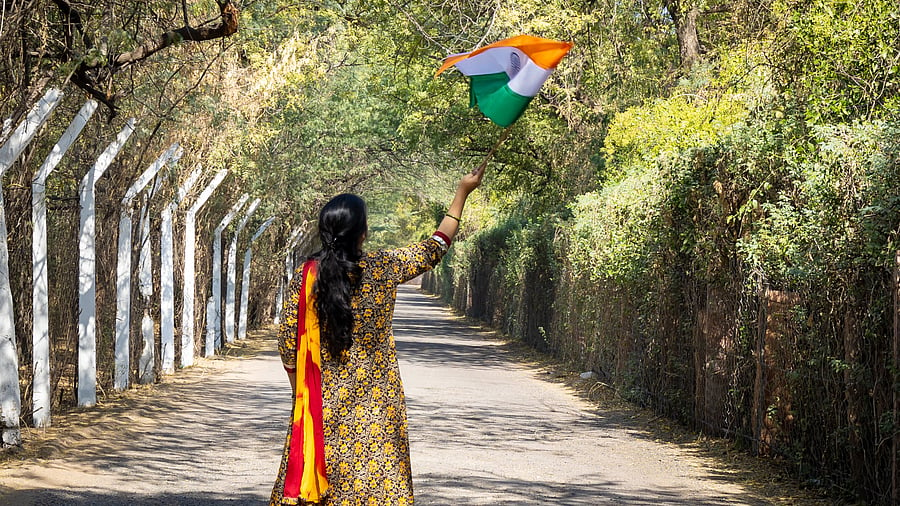
A woman waves a Tricolour. Image for representation.
Credit: iStock Photo
Over 75 years after attaining Independence, the Indian State doesn’t have to force-feed citizens with the cult of patriotism and nationalistic fervour. Yet it does, while also punishing citizens who are inadequately ‘respectful’ to national symbols. Such paranoia is unseemly in a nation-state that wants a seat at the United Nation’s high table.
A news report published in June said the J&K authorities had passed a circular directing all schools, including private ones, to begin the day with a rendition of the national anthem. It was a four-year-old decree that, apparently, was being followed more in the breach. In 2022, the Karnataka government, too, had passed an order to this effect.
You could argue that most schools start their day with an assembly where songs are sung, verses recited, or mantras or prayers chanted. So, why not the anthem? The simple reply is that there is no reason for the State to coerce children into dull uniformity.
There is at least a question of uniformity and discipline in schools. But what when this drive for disciplining is transposed to the citizenry? In the context of fostering patriotism and/or nationalism, absurdity abounds.
There has been a long-standing controversy about standing up when the national anthem is being played. The issue became fraught in 2016 and 2018, when some people who remained seated while the anthem was being played in cinemas were assaulted for being ‘anti-national’. In J&K, some people were jailed in July 2023 for remaining seated.
The Supreme Court has at various points of time passed different orders on this vexed question. In 2003, it made standing up to show respect mandatory. In 2016, it upheld the view. In 2018, in the same case, the top court made the screening of the anthem optional in cinemas, but stuck to the view that standing was compulsory, exempting people in special categories.
However, in 1986, the top court exempted three children of the Jehovah’s Witness sect from singing the anthem in school, citing their fundamental right to religious belief under Article 25 of the Constitution.
That judgment opens the door to the reasoned position that it is a basic right of citizens to decide for themselves whether they will stand up or not. In the first place, whether they wish to be patriotic or nationalistic, and then whether they wish to demonstrate respect to the national anthem, flag, and other symbolic objects of nationalistic attachment.
Conduct apropos national symbols is policed by the Prevention of Insults to National Honour Act, 1971, which seeks to inculcate forcibly among the citizenry a sense of respect. It lays down in some detail how national symbols should not be desecrated. Thus, the national flag cannot be used as a costume or be allowed intentionally to trail on the floor.
An absurd extension of this paranoia was brought home to tennis player Sania Mirza when legal proceedings were brought against her in 2008 for putting up her feet on a table on which the national flag was placed.
Let’s unpack the issues involved. Patriotism is love for the ‘country’, which we may define as the ‘people’ or ‘nation’. Nationalism is the sense of attachment to the nation-state, which is a particular political-territorial expression of the people-nation. The attempt to police citizens’ conduct in relation to the national symbols does not seek to inculcate in them ‘a love for the people-nation’, but a reflexive respect for and obedience to the nation-state, and its specific institutional forms.
Forced obedience and respect are anathema to democracy and individual freedom, especially because a lack of demonstrated respect for the nation-state, and its symbols and agencies, does not necessarily translate into seditious or treasonous conduct. Just as the Supreme Court struck a blow for freedom of religious observance in the Jehovah’s Witness case, it is clear that Article 25 gives us the fundamental right to freedom of conscience. It is out of this conscience that respect for the nation-state and love of the nation should issue, or not.
What should be at issue overwhelmingly is civic responsibility. That is what the agencies of the State should seek to inculcate in citizens. Respect for the rule of law could top the list of goals to be achieved. And, surely, it is the governing class, consisting of the bureaucrats and the politicians, which should show the way forward by exemplary conduct.
Forced genuflection to symbols neither helps develop civic and social responsibility nor creates the ambience of freedom in which the nation and its democratic aspirations can flourish.
(Suhit K Sen is author of ‘The Paradox of Populism: The Indira Gandhi Years, 1966-1977’.)
Disclaimer: The views expressed above are the author's own. They do not necessarily reflect the views of DH.